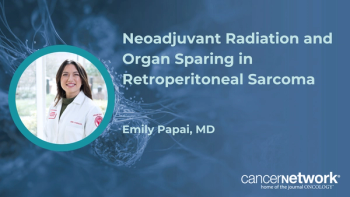
Oncology NEWS International
- Oncology NEWS International Vol 4 No 3
- Volume 4
- Issue 3
Rosenberg Hopes to Expand Use of Immunotherapy
NEW YORK--Immunotherapy approaches have been used successfully to treat and even cure a very small subset of patients with advanced solid cancers. The challenge is to increase the types of cancer that are responsive to immunotherapy,
NEW YORK--Immunotherapy approaches have been used successfullyto treat and even cure a very small subset of patients with advancedsolid cancers. The challenge is to increase the types of cancerthat are responsive to immunotherapy, Steven A. Rosenberg, MD,PhD, said at a symposium on cancer vaccines sponsored by the CancerResearch Institute.
Dr. Rosenberg and his colleagues at the NCI, where he is chiefof surgery, have been using autologous tumor infiltrating lymphocytes(TILs)--lymphoid cells that can be cultured from tumors--plushigh-dose interleukin-2 (IL-2) to treat patients with progressivemalignancies, most notably melanoma. The patients had failed othertreatments. A complete regression of all metastatic disease wasachieved in 10% of patients.
By focusing on the ability of TILs to recognize melanoma antigensand identifying the antigens involved in the tumor recognitionprocess, Dr. Rosenberg hopes to generate principles that can beapplied to the treatment of other tumors.
He noted that TIL cells can be isolated that appear to be uniquelyreactive against tumor-associated antigens from a variety of histologies--inabout a fourth of patients with breast, colon, and ovarian cancersand non-Hodgkin's lymphomas.
Adoptive Transfer of MART-1
In a study reported this year, TILs were used to clone and sequencethe genes that encode melanoma antigens, including MART-1 (melanomaantigen recognized by T cells). This gene encodes a previouslyundescribed transmembrane protein whose expression is restrictedto melanoma, melanocyte cell lines, and human retina. Anothergene identified encoded the glycoprotein gp100 and was recognizedby the melanoma-specific antibody MB-45.
NCI researchers are using this information for the in vitro sensitizationof cells directed against immunodominant peptides and for developmentof viral vaccines expressing these gene products. These in vitrosensitized anti-MART-1 cytotoxic T cells are 25- to 100-fold higherin lytic activity than conventional TILs, and secrete cytokineswhen co-cultured with the autologous target cells, he noted.
Clinical trials using the adoptive transfer of these cells plusIL-2 to treat patients with metastatic cancer are set to beginsoon, Dr. Rosenberg said.
NCI investigators are also looking at improved delivery of immunomodulators.New delivery methods could hold the key to the effective use oftumor necrosis factor (TNF) in humans, Dr. Rosenberg said.
In previous studies, TNF proved capable of inducing cancer regressionin mice but had no impact on the treatment of human disease.
The reason for the discrepancy, Dr. Rosenberg believes, is the50-fold difference in the administration of TNF between mice andhumans. The effective dose in mice is 400 mcg/kg, 50 times thedose tolerated by humans.
The NCI investigators had originally planned to use TIL cellsto deliver the TNF to the tumor site, but now Dr. Douglas Fraker,who works with Dr. Rosenberg, has adopted an isolation perfusiontechnique used by a Belgian researcher in which the blood in anextremity containing a cancer is circulated ex vivo and exposedto high levels of TNF, sparing the rest of the body.
At the NCI, objective tumor regressions have been seen in 24 of25 consecutive patients who had isolation perfusion of the limbwith TNF in high concentrations, Dr. Rosenberg said. Completeregressions have been seen in melanoma patients with multiplelesions, and regressions have been observed in colorectal cancerpatients with liver metastases.
Dr. Rosenberg also mentioned a patient with a large Ewing's sarcomawho had failed chemotherapy and refused amputation. This patientshowed a remarkable reduction in the size of the tumor after asingle 60-minute perfusion of TNF, he said.
He added that a hypersecreting form of the TNF gene has recentlybeen introduced into TIL cells in phase I studies.
Vitiligo Patients May Hold Clue to Melanoma Antigens
A phenomenon observed over the years, that melanoma patients treatedwith immunotherapy often develop vitiligo, may hold a clue tothe identification of melanoma antigens that could be used intreatment, Dr. Rosenberg said in his discussion of tumor-infiltratinglymphocytes (TILs) that recognize MART-1 (melanoma antigen recognizedby T cells).
Vitiligo has been seen in melanoma patients but not in renal cellcancer patients treated with immunotherapy, he said.
In studies of melanoma patients given autologous TILs plus IL-2,the development of vitiligo was highly correlated with response.In 27 nonresponders, there was no vitiligo. In 42 responding patients,12 had vitiligo, he said.
Dr. Rosenberg is planning a collaboration with the vitiligo clinicat Howard University where 900 patients with spontaneous vitiligoare being followed.
"It's entirely possible that patients with vitiligo willhelp us define other melanocyte differentiation antigens thatmight well be useful in the treatment of melanoma patients,"Dr. Rosenberg commented.
Articles in this issue
almost 31 years ago
Selecting a Support Group for Patients With Prostate Carcinomaalmost 31 years ago
Antman Provides Outlook on Use of High-Dose Chemoalmost 31 years ago
Radiofrequency Ablation of Brain Tumors New Optionalmost 31 years ago
Oncologist Enthusiastic About Capitated Planalmost 31 years ago
GAO Says Federal Research Needed on Safety of Portable Cellular Telephonesalmost 31 years ago
Varmins Chooses New Director for NIH Office of Alternative Medicinealmost 31 years ago
'Visible Man' Hits the Internet, Radiologists Get the First Lookalmost 31 years ago
Ultrafast Full-Body MRI Eases Procedure in Claustrophobics, KidsNewsletter
Stay up to date on recent advances in the multidisciplinary approach to cancer.





































